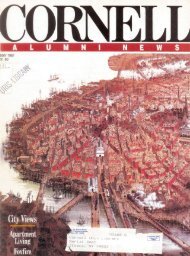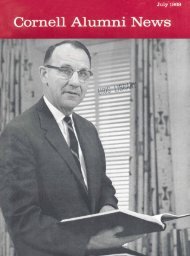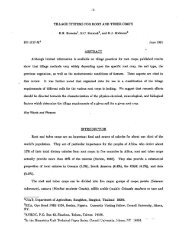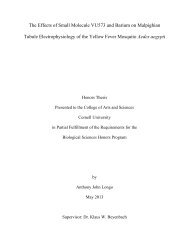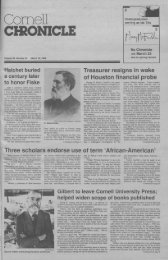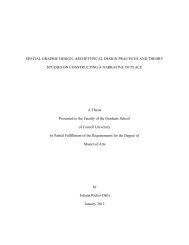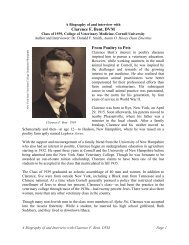Peru: you'll never see more species! - eCommons@Cornell - Cornell ...
Peru: you'll never see more species! - eCommons@Cornell - Cornell ...
Peru: you'll never see more species! - eCommons@Cornell - Cornell ...
You also want an ePaper? Increase the reach of your titles
YUMPU automatically turns print PDFs into web optimized ePapers that Google loves.
says, "are joint research programs, industrial<br />
companies who will come to us<br />
as affiliates or send visiting lecturers,<br />
continuing programs in professional education,<br />
joint conferences, opportunities<br />
for consulting and faculty work in<br />
industry, joint efforts to address national<br />
problems like pollution, productivity,<br />
automation. All of those we ought to be<br />
playing an increasingly important role<br />
in, and we've got to do it in partnership<br />
with industry."<br />
About three years ago, with such ideas<br />
in mind, Rhodes created the Corporate<br />
Liaison Committee, composed of highlevel<br />
executives in industry, many of<br />
them <strong>Cornell</strong> alumni. Robert G. Engel<br />
'53, vice president and treasurer of Morgan<br />
Guaranty Trust Company, and<br />
Charles F. Knight '57, chief executive<br />
officer of Emerson Electric, are cochairmen<br />
of the committee.<br />
According to Knight, committee<br />
members <strong>see</strong> their job as one of helping<br />
the university "interface" with industry,<br />
for the benefit of both sides. "The channels<br />
of communication get better and the<br />
money gets spent <strong>more</strong> effectively," he<br />
says, emphasizing that the committee<br />
has merely made suggestions, and that<br />
any actual accomplishments in improving<br />
industry-university cooperation<br />
should be credited to university staff.<br />
Rhodes credits the committee with<br />
helping to restructure the office of the<br />
vice president for research, bringing<br />
graduate and post-doctoral education<br />
and patents and licensing under its jurisdiction.<br />
The committee is to meet again<br />
this spring, and Rhodes hopes it will,<br />
among other things, look at ways <strong>Cornell</strong><br />
can contribute to continuing professional<br />
education for industry.<br />
Others, like Prof. W. Donald Cooke,<br />
Chemistry, who retired last year from<br />
the research vicepresidency Barker now<br />
holds, point out that industry-university<br />
ties used to be very close, but have faded<br />
since the federal government began to<br />
supply massive funding for basic research.<br />
Barker agrees. "Most chemistry departments<br />
thirty years ago had lots of industrial<br />
connections," he says. "Some<br />
of them have kept a few, but they became<br />
less and less important as the federal<br />
money poured in." He <strong>see</strong>s what's<br />
happening now as a "pendulum swing"<br />
back to the old ways. Both agree that a<br />
number of changes in society over the<br />
last few years have helped move the pendulum.<br />
Among them:<br />
• Industry is becoming <strong>more</strong> and<br />
<strong>more</strong> dependent on high technology,<br />
both for its products and the methods of<br />
manufacturing them. The time lag be-<br />
CORNELL ALUMNI NEWS<br />
President summons<br />
alumni to plan<br />
new avenues<br />
of cooperation<br />
with companies<br />
tween basic discoveries and marketable<br />
products is growing shorter.<br />
• Engineering colleges are doing <strong>more</strong><br />
research, in addition to teaching.<br />
• Industries themselves are doing<br />
<strong>more</strong>, and better quality research. This<br />
means a company will have <strong>more</strong> scientists<br />
on its staff who have some sort of<br />
relationship with university scientists.<br />
• Industry depends on the universities<br />
to train future workers, and today they<br />
must be highly trained in science and<br />
technology. They get this training by doing<br />
and being exposed to actual research,<br />
so it's in the best interests of industry<br />
to support that research.<br />
• New technologies, especially biotechnology<br />
and semiconductors, have<br />
caught industries napping, without any<br />
research base of their own. Most of the<br />
advances in biotechnology so far have<br />
been in universities, so industries are going<br />
to the source.<br />
• Increasing numbers of university<br />
scientists are being tied up in exclusive<br />
contractual relationships in their offcampus<br />
hours with one company or another.<br />
Getting industry funding for oncampus<br />
research <strong>see</strong>ms preferable.<br />
• When Congress cut back on research<br />
funding, it also increased tax<br />
credits to industry for research expenditures.<br />
Industries can often get "<strong>more</strong><br />
bang for the buck" by financing outside<br />
research than by doing it in-house.<br />
Campus research relationships with<br />
corporations lead to corporate giving in<br />
other areas, according to Ron Stone.<br />
"We would not have received $12.8 million<br />
in corporate philanthropic support<br />
last year," Stone says, "if it were not for<br />
the history of faculty ties with companies.<br />
We are known to many of those<br />
companies because of the research ties."<br />
Stone's job is to keep in touch with<br />
key people at some 200 corporations to<br />
which <strong>Cornell</strong> might turn for specific financial<br />
needs. He doesn't handle research<br />
funding, which is Barker's responsibility,<br />
but he <strong>see</strong>s research relationships<br />
as one of many entrees—he<br />
uses the word "ports"—through which<br />
he might approach a company, along<br />
with, say, student recruiting or alumni<br />
who work there.<br />
Corporate philanthropy, like research<br />
funding, is based on enlightened self-interest,<br />
Stone believes. "Corporations<br />
are not in business to give away<br />
money," he points out. "In fact, they<br />
are in business to keep it. That they give<br />
at all is somewhat amazing!" They do<br />
give, he says, because their lifeblood is<br />
tied to the educational process and to its<br />
product.<br />
Industry representatives agree. Richard<br />
Darragh, PhD '57, director of product<br />
development for Procter & Gamble,<br />
says, "I think most corporations realize<br />
corporate citizenship is important. If society<br />
is not healthy, we can't maintain a<br />
healthy corporation."<br />
Not everyone welcomes the industry<br />
connection, however. When the biotechnology<br />
center was brought before the<br />
Faculty Council of Representatives for<br />
approval, there were about eighty<br />
"ayes" and four or five "nays" in the<br />
voice vote. According to Barker, the dissenters<br />
argued that there are such different<br />
philosophies guiding the university<br />
and corporations that the two cannot interact<br />
without one perturbing the other.<br />
Barker adds that "the people putting<br />
forth that argument perceived that all<br />
the perturbation would be in the direction<br />
of the university. You could argue<br />
that it might all flow the other way."<br />
Prof. Walter Lynn, Environmental<br />
Engineering, director of the Program on<br />
Science, Technology, and Society (STS),<br />
and Prof. Franklin A. Long, Chemistry,<br />
emeritus, a member of STS, have studied<br />
industry-university interaction in<br />
some detail and written two articles on<br />
the subject. Lynn suggests several concerns<br />
that he feels must be dealt with if<br />
the university is to work <strong>more</strong> closely<br />
with industry.<br />
First, he worries that emphasis at universities<br />
may shift away from basic to<br />
applied research. Even when they support<br />
"basic" research, industry funders<br />
will be looking for practical applications,<br />
at least somewhere down the road,<br />
and not all basic research comes with<br />
built-in justification. For example, Lynn<br />
says, "If I want to study the stars, I really<br />
have to struggle to explain what use<br />
it's going to be. The interest of astronomers<br />
is really just to understand something.<br />
The object of basic research is to<br />
try to understand what nature is about in<br />
extraordinarily lavish detail."<br />
"The training of graduate students,"<br />
he adds, "is intimately tied to the research<br />
those students do. If they do ap-




